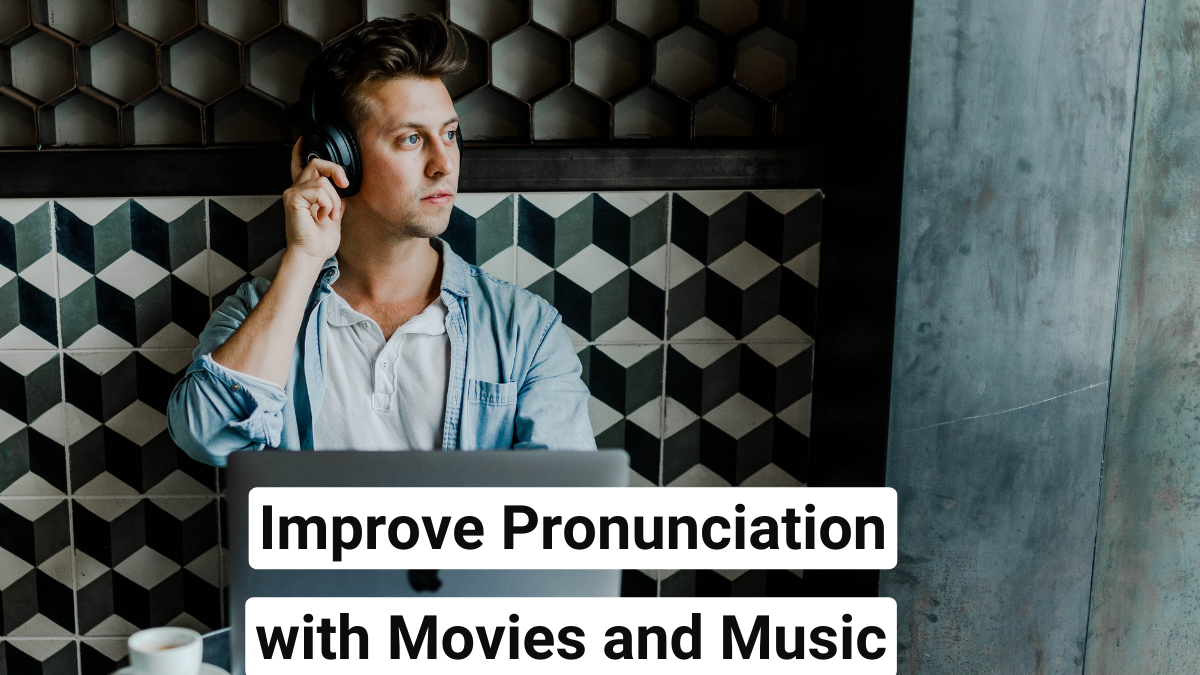If you are learning a foreign language and you want to learn how to pronounce words like a native speaker, read on for some useful tips and tricks!
We will focus specifically on English pronunciation, as this is a language notorious for having complex and inconsistent spelling and pronunciation. All language learners can benefit from this guide, particularly English learners.
First, we'll look at how you can learn a language with music movies, then we'll address the challenges of learning different accents and pronunciation and provide 5 top tips for language learners.
See also: How to Learn English with TV and Videos
Learning A Language with Movies and Music
Non-native speakers can benefit greatly from exposure to natives singing or speaking English. A native English speaker will naturally put word stress in the right place and speak with a fluidity that is very helpful for pronunciation and accent learning.
Authentic and natural exposure to a native speaker from music and movies allows learners to pick up the sounds of the language while having fun.
They can immerse themselves in quality content and acquire new language skills organically.

Movies and music will also expose learners to new vocabulary, grammatical tenses, and elements of culture and society from different countries where English is spoken.
Lingopie is an awesome streaming service with a catalog of TV shows and movies in 8 popular languages, as well as music to stream in Spanish for language learners.
Check out: Learn How to Say Slang Words and Phrases in Spanish
Why Pronunciation and Accents Can Be So Tough
Depending on your mother tongue, there will be some languages that contain sounds you have never used before and therefore are very challenging to say. Check out our accent reduction guide.
For instance, French and English speakers often struggle with the Spanish "rr" sound, while Japanese natives cannot always distinguish the "r" and "l" sounds in English.
Related: Curse Words in the French Language: Using French Swear Words Like a Pro
Moreover, for every language, there is a variety of accents. Accent and pronunciation are not synonymous; an accent includes pronunciation, but it also tells you more about a person.
Everyone has an accent. A regional accent will indicate to people where you grew up, while a social accent might indicate your socio-economic class. And if you are not speaking your native language, you will have a foreign accent.
All of this means that there can be several "right" ways to say a word, depending on where you are from or who you ask. However, this does not mean there are no wrong ways to pronounce words in English!
5 Tips for Excellent English Pronunciation
1. Pick An Accent and Be Consistent
Note that when you are learning "good pronunciation" of English words, you should be aware of whether you are learning British pronunciation, or something else, such as Australian, American, Canadian, or any other distinct accent from different English-speaking countries.
Try to decide early on if you want to develop a British English accent, or something else. If you are not consistent with your accent, it might sound like you are mispronouncing words, when in fact you're saying some like a Brit and others like an Australian!
Many language learners in Europe learn British English with quite neutral English accents, while learners in the Americas tend to learn with American accents.
Remember, if you choose to study abroad for a while in an English-speaking country, you might develop a local accent.
If you choose to spend time in the north of England, Scotland, Ireland, or a southern US state, for instance, you could develop a strong and noticeable accent.
There are no "good" or "bad" British, Irish or American accents, despite what some people might tell you, merely different ones! If you love the way a specific region pronounces certain sounds, why not visit that area and learn from the locals?
2. Pronounce (English) Words like Native Speakers
Whether you struggle with pronouncing English or any other foreign language, you might be wondering how to develop correct pronunciation.
Well, listening to native speakers is one of the best ways to develop a great accent yourself.
The more exposure you get to native speakers of your target language, the better. Music, TV, and movies are all great tools, especially if you're not in a country where your target language is spoken.
Mimicking musical artists and movie stars from an English-speaking country is the best method of learning pronunciation and developing listening skills. Moreover, it's a lot of fun, as you get to enjoy their art!
Visual learners might benefit more from watching videos of English speakers, while auditory learners can opt for English podcasts, music, or audiobooks. Listen carefully to the different accents, and see if you can tell them apart.
Repeat words that are spoken by a native English speaker when you hear them in music and movies to actively work on your English pronunciation.
3. Practice Tongue Twisters
This is a fun tip for any non-native English speaker working on English phonemes. Tongue twisters are sentences that repeat the same difficult sound over and over in different words.
A classic example is "Peter Piper picked a peck of pickled peppers". The repeated "p" and "k" sounds can cause even Native English speakers to trip up
Try saying "she sells sea shells on the sea shore". This is a good practice of minimal pairs; words that have almost the same pronunciation, but with one sound that is different.
Repeat these phrases until all the sounds are formed correctly so that each word can be distinguished clearly.
Notice that many sounds in English pronunciation rely on an open-mouth position, rather than a closed-mouth position.
Constructing sentences with difficult sounds can be a real challenge for non-native speakers, but tongue twisters are a great help.
They train the tongue to form sounds correctly and not trip over word endings.
4. Read Aloud
One of the best ways to improve your English pronunciation is to speak English as often as you can. Speaking English aloud can help you to get your head around pronunciation much better than just hearing the words in your head, or listening to someone else say them aloud.
Reading aloud is good fluency and English pronunciation training when you don't have a talking partner handy.
Send an audioclip of you reading aloud to a native speaker or English teacher for feedback on your English accent.
Speak English aloud to develop the correct word stress when pronouncing words. When you are unsure of the stress or pronunciation, look it up.
Most online dictionaries have a feature that can speak English words aloud.
If you come across a long word, tackle it one syllable at a time, rather than attempting the whole word. If you struggle to count how many syllables are in a word, remember that every syllable should have a vowel or a "y". For instance "sy/lla/ble" has three syllables.
When you think you've got it, say the word slowly aloud and hold your hand under your chin. The amount of times your chin hits your hand is the number of syllables in the word.
5. Learn the Anomalies
Finally, one of the big challenges with English pronunciation is English spelling. When you are taught English, you begin to notice that certain words seem to have anomalous pronunciation.
Many English words are spelled with the same word endings but have totally different sounds when spoken aloud.
You would be forgiven for assuming that one set of letters would produce just one sound in English, but you would be wrong.
For instance, look at the following 5 English-language words that are all pronounced differently:
- Tough
- Cough
- Bough
- Through
- Dough
All of these words end in the four letters "ough", but none of them rhymes. That's right, not one of these words is pronounced the same.
The "ough" in "tough" is pronounced like "uff", while in "cough", it is pronounced like "off".
Meanwhile, the "ough" in "bough" is said like "ow", in "through", it is "ooh" and, finally, in "dough", the "ough" is pronounced "oh".
English pronunciation has so many different sounds for the same set of letters because it has both Latin and Germanic roots, so it grew from different language families all with their own pronunciation.
Type each "ough" word in turn into Google Translate and listen to the automated voice say them aloud. This will give you an idea of the differences.
However, remember two things: Google Translate is not always reliable (especially when you are translating a long sentence!) and its "voice" has an American accent. You will need to find a different source for English accent pronunciation.
Sometimes, you just have to learn how to pronounce English words correctly one at a time.
Where to Find Great Content to Improve English Pronunciation
Find awesome movies in your target language on streaming platforms like Netflix, Amazon Prime, and Lingopie.
For music, head over to streaming sites such as Apple Music and Spotify. Lingopie has also introduced Lingopie Music for Spanish learners.
Moreover, listen to podcasts or audiobooks on Audible, or check out Youtube and other social media sites for useful content.
Instagram reels and TikToks are full of potential, especially if you only like to concentrate for a short amount of time, and any YouTube video made by native speakers will be awesome for pronunciation and listening practice.
Learn the International Phonetic Alphabet
Finally, a great way to improve your English pronunciation, or your pronunciation of any language for that matter, is by learning the international phonetic alphabet.
Regardless of which foreign language you're learning, the phonetic alphabet can help you make sense of the various sounds. This alphabet is international, so language teachers in any country can use it as a teaching tool.
If you want to be a teacher overseas, you can use the phonetic alphabet to explain how to pronounce words correctly in your mother tongue.
The phonetic alphabet is often used by TEFL (Teaching English as a Foreign Language) teachers to help teach English sounds.
Therefore, if you are learning English in a formal setting, you can also benefit from learning the phonetic alphabet, as it might be used as a teaching tool in your classes.
FAQs: How To Perfect Pronunciation
How can I improve my pronunciation?
You can improve your English pronunciation, or your pronunciation of any other foreign language, by listening to music and watching TV featuring native speakers.
Exposure to native (English) speakers allows you to naturally develop good word stress and mimic the sounds of the language.
Moreover, our 5 tips to improve English pronunciation will help learners develop their English skills while having fun.
Is it possible to have perfect pronunciation in a non-native language?
Yes, with a lot of practice, it is possible to speak a foreign language like a native.
How close you get to perfecting your pronunciation will depend on your mother tongue and which language you are learning, as some have more similar sounds than others.
Remember, the goal does not need to be perfection, and having a foreign accent is always ok!
Are pronunciation skills and word stress really important?
Yes, you can only successfully speak English, or any other foreign language, if your pronunciation can be understood.
Mispronouncing words can lead to communication breakdowns, especially if you accidentally say another word with a totally different meaning.
An example of this is the word "present". If you stress the first syllable of this word ("PRE-sent"), you are talking about a gift.
Whereas, if you pronounce the second syllable of the word ("pre-SENT"), you are referring to the act of making something known.
Improve your English pronunciation and word stress to give yourself the best chance of being able to communicate with native English speakers.

Summing Up: Perfect your accent and pronunciation through movies and music
Learning a second language can be challenging, especially when it comes to pronouncing difficult words and sounds.
In fact, getting the right tongue and mouth position is something of a physical skill.
Depending on your mother tongue and your target language, pronunciation and accent training might be one of the harder elements of language learning.
Luckily for you, the best language-learning resources are also the most fun!
Listen to music and watch movies in your target language to absorb the correct pronunciation of words. Use our top 5 tips for excellent pronunciation to get started and remember to check out Lingopie for great music and movie content!






![5 Official Spanish Language Tests To Show Your Proficiency Level [Guide]](/blog/content/images/size/w300/2025/06/Spanish-Language-Tests.jpg)
![Why Memorizing Spanish Words Won’t Make You Fluent [Tips]](/blog/content/images/size/w300/2025/06/how-to-practice-spanish-vocabulary.jpg)
![How to Improve Your Polish Conversation Skills [5 Best Tips]](/blog/content/images/size/w300/2025/06/improve-polish-conversation-skills.jpg)
